Best Sunscreen for Men [2023]
Written by Emily Crane |
Last updated May 10, 2023
Medically reviewed by Enrizza Factor, M.D.
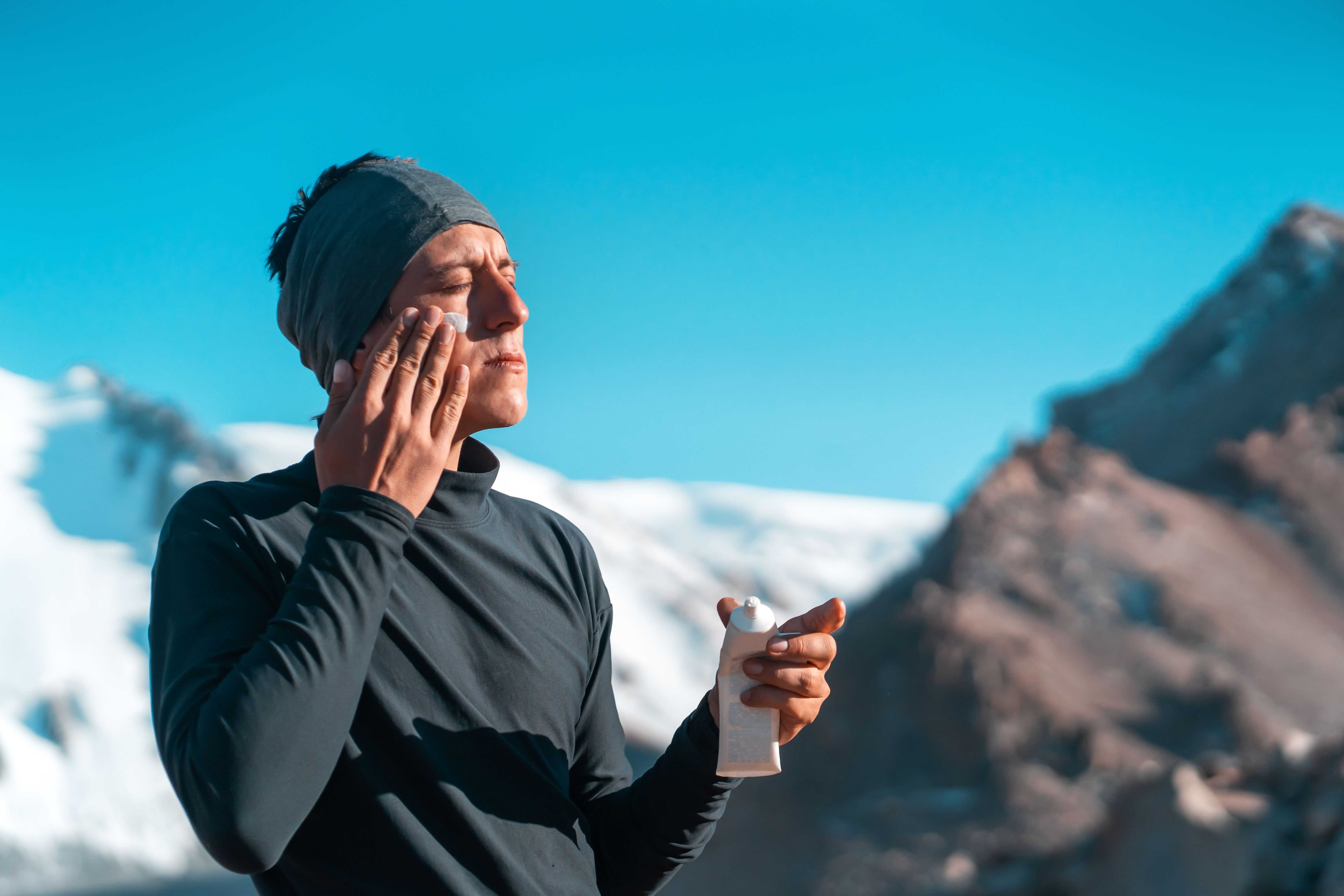
If you’re like most men, sunscreen isn’t even a consideration unless you plan to spend the day outside. But regardless of whether you’re planning to spend ten minutes or ten hours outdoors, sunscreen is an essential part of any skincare routine. We all know sunscreen helps prevent cancer and sunburn, but it also helps keep fine lines, wrinkles, age spots, and other signs of damage at bay—and if something as simple as applying a little sunblock can help you look five or ten years younger, why wouldn’t you?
In this article, we’ll break down everything you need to know about choosing the best sunscreen, taking into consideration factors such as skin type, level of sun protection, and ease of application. From mineral-based sunscreens to sprays and lotions, we've got you covered. Whether you're looking for an everyday sunscreen or a heavy-duty product for active days in the sun, this guide will help you make an informed decision and keep your skin protected all year long.
Our Top Picks
Best Everyday Sunscreen: Jack Black Oil-Free Sun Guard SPF 45 Sunscreen
Best SPF Moisturizer: Geologie Moisturizing Face Cream with SPF15
Best for the Face: Every Man Jack SPF 50 Face Shield Sun Stick
Best Reef-Safe Sunscreen: Blue Lizard Sensitive Mineral Sunscreen Lotion
Best Sunscreen for Workouts: EltaMD UV Sport Broad-Spectrum SPF 50
Best Anti-Aging Sunscreen: Jacket SPF 50+ Sunscreen
Best Sunscreen Spray: Oars + Alps Hydrating Antioxidant SPF 50 Spray
Best Sunscreen for Sensitive Skin: La Roche-Posay Anthelios Mineral Sunscreen Gentle Lotion Broad Spectrum SPF 50
Best Sunscreen for the Family: Supergoop PLAY Everyday Lotion SPF 50 with Sunflower Extract
Best Sunscreen for the Beach: Sun Bum Signature SPF Sunscreen Lotion
Best Budget-Friendly Sunscreen: Neutrogena Hydro Boost Water Gel Lotion SPF 50
Best for All-Day Protection: Kiehl's Facial Fuel Men’s SPF 20 Moisturizer
Best Everyday Sunscreen: Jack Black Oil-Free Sun Guard SPF 45 Sunscreen
Jack Black’s Oil-Free Sun Guard sunscreen is packed with vitamins and offers sweat-proof UVA/UVB protection that stays put during active days in the sun. Its oil-free formula absorbs quickly, offering maximum protection without drying.
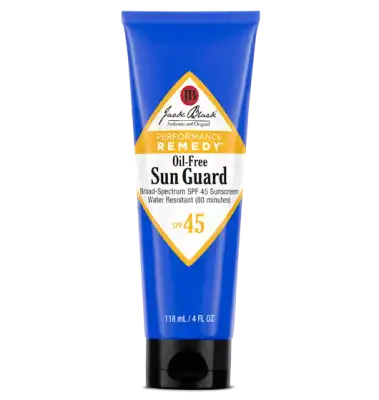
The "Good"
- Lightweight, non-greasy mineral formula.
- Absorbs quickly and leaves no white cast.
The "Could Be Better"
- Zinc Oxide may be more irritating to eyes than chemical sunscreen.
Active Ingredients
Best SPF Moisturizer: Geologie Moisturizing Face Cream with SPF15
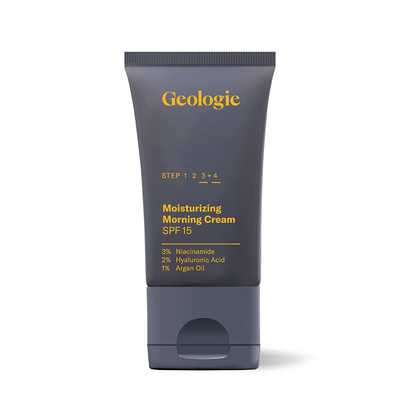
The "Good"
- Ocean Friendly SPF15
- Smooth application
The "Could Be Better"
- Price tag
Active Ingredients
Best for the Face: Every Man Jack SPF 50 Face Shield Sun Stick
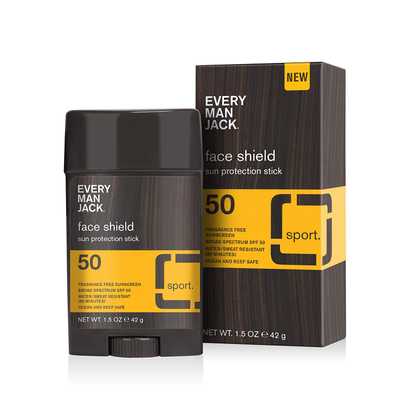
The "Good"
- Convenient, easy-to-apply stick
- Keeps skin nourished in extreme weather conditions
The "Could Be Better"
- Not as versatile as other sunscreens due to its size
Active Ingredients
Avobenzone, Homosalate, Octisalate, Octocrylene, Shea Butter, Vitamin E, Aloe
Best Reef-Safe Sunscreen: Blue Lizard Sensitive Mineral Sunscreen Lotion
Blue Lizard's SPF 50+ mineral sunscreen offers their strongest UV protection yet, with 80 minutes of water and sweat resistance. It's made with zinc oxide and titanium dioxide to shield against UVA and UVB rays, without any harsh chemicals that could irritate your skin. Plus, it's reef safe and free of oxybenzone and Octinoxate, helping to protect fragile ecosystems.
Not only is Blue Lizard's sunscreen effective, but it's also cool! The smart cap technology is a unique feature that turns blue in the presence of harmful UV rays, serving as a helpful reminder to stay safe in the sun. Plus, the fact that dermatologists have trusted this brand for over 20 years speaks to the quality and effectiveness of their products - which is crucial when it comes to protecting your skin from the sun's harmful rays.

The "Good"
- Reef-safe without oxybenzone or Octinoxate, which can harm coral reefs
- Smart cap technology that changes color when exposed to UV rays
- Water-resistant for up to 80 minutes
The "Could Be Better"
- Some users may find it challenging to spread the thick formula evenly on the skin
- May leave a white cast on darker skin tones
Active Ingredients
Best Sunscreen for Workouts: EltaMD UV Sport Broad-Spectrum SPF 50
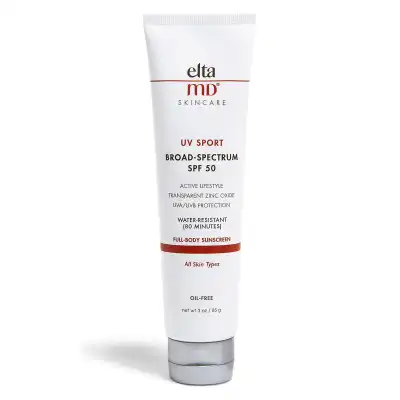
The "Good"
- Best-in-class water- and sweat-resistance
- Perfect for face and body
The "Could Be Better"
- Creamy texture may not be light enough for the face
Active Ingredients
Best Anti-Aging Sunscreen: Jacket SPF 50+ Sunscreen
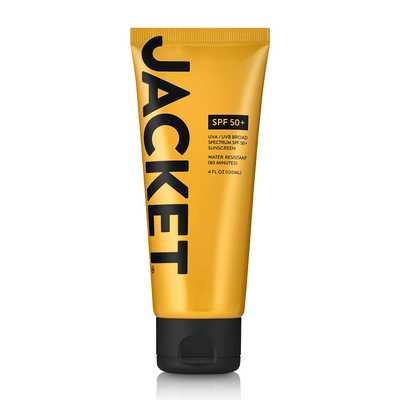
The "Good"
- Absorbs well and feels lightweight
- Swiss-army knife product that nourishes, moisturizes, and protects
The "Could Be Better"
- Some users dislike the lemongrass scent
Active Ingredients
Best Sunscreen Spray: Oars + Alps Hydrating Antioxidant SPF 50 Spray

The "Good"
- Easy spray-on application
- Lightweight, non-drying formula
The "Could Be Better"
- At $18 per 6-ounce can, it’s on the pricier side
Active Ingredients
Best Sunscreen for Sensitive Skin: La Roche-Posay Anthelios Mineral Sunscreen Gentle Lotion Broad Spectrum SPF 50
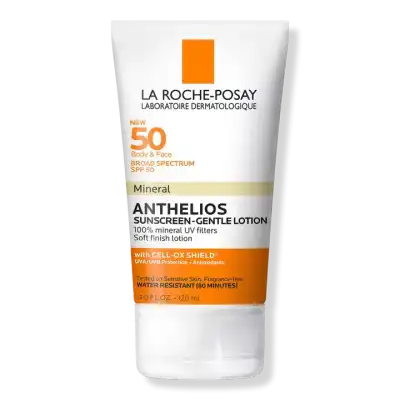
The "Good"
- Oil-free, non-greasy formula leaves a soft matte finish.
- Fragrance-free for sensitive skin.
The "Could Be Better"
- May leave a light cast.
Active Ingredients
Best Sunscreen for the Family: Supergoop PLAY Everyday Lotion SPF 50 with Sunflower Extract
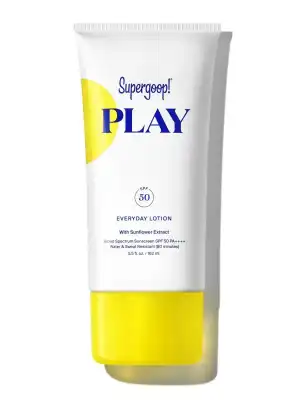
The "Good"
- Water- and sweat-resistant for up to 80 minutes
- Comes in a large, 18-ounce pump bottle–perfect for family
The "Could Be Better"
- Heavier formula
Active Ingredients
Best Sunscreen for the Beach: Sun Bum Signature SPF Sunscreen Lotion
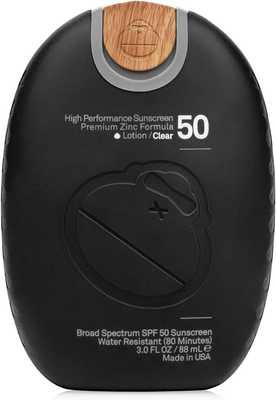
The "Good"
- Super long-lasting formula is perfect for all day wear under extreme conditions
- Reef-friendly
The "Could Be Better"
- Comes only in 3.5 or 1 oz bottle
Active Ingredients
Best Budget-Friendly Sunscreen: Neutrogena Hydro Boost Water Gel Lotion SPF 50
Neutrogena’s Neutrogena Hydro Boost Water Gel Lotion offers nourishment and hydration alongside broad spectrum UVA/UVB protection. Its unique, feather-light formula is perfect for everyday use anywhere on the body, including sensitive areas such as the face.
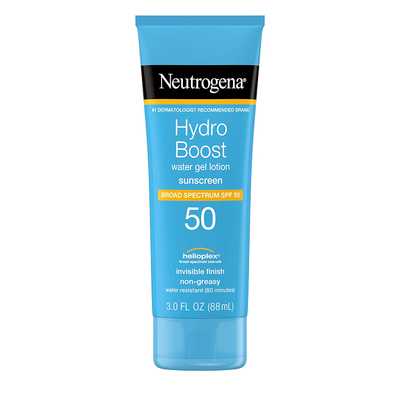
The "Good"
- Light, clean feel that doesn’t leave a cast
- Hydrating yet non-greasy
The "Could Be Better"
- Product has a light floral scent
Active Ingredients
Best for All-Day Protection: Kiehl's Facial Fuel Men’s SPF 20 Moisturizer
Kiehl’s SPF 20 Moisturizer is a perfectly hydrating, no-fuss revitalizing moisturizer that does double-duty as a daily sunscreen. It goes on smoothly and provides non-greasy protection without clogging pores.
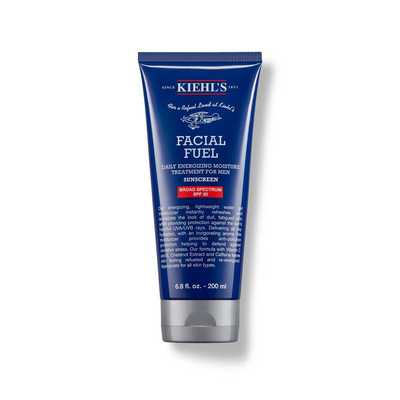
The "Good"
- Invigorating formula gives skin a brighter appearance
- Paraben- and Sulfate-free
The "Could Be Better"
- Recent formula changes haven't met some consumers’ expectations
Active Ingredients
What to Consider When Choosing Sunscreen
With a dizzying array of suncare products on the market, choosing a sunscreen isn’t easy. When you’re serious about skincare, you know better than to grab whatever’s cheapest at the drugstore on your way to the beach—you’ll probably want to research a few options so you can find a quality product to use every day. Here’s what you should look for on your quest:
Sun Protection Factor (SPF)
A sunscreen’s sun protection factor is, according to the FDA, a measure of “how much solar energy is required to produce sunburn on protected skin relative to the amount of solar energy required to produce sunburn on unprotected skin.” For everyday use, SPF 15 is fine. If you’re a guy who spends a lot of time outdoors, opt for SPF 50 or above. And don’t forget a hat.
Recommended reading: Best Men's Moisturizer with SPF
Broad Spectrum
The term “broad spectrum” refers to the types of ultraviolet rays your sunscreen protects against. Broad spectrum sunscreen protects against both UVA rays, which cause aging, and UVB rays, which cause burning. Both can cause skin cancer, which is why it’s critical to choose a broad–spectrum sunscreen.
Active Ingredients
In the United States, there are only a handful of active ingredients approved by the FDA for sun protection. They fall into two categories: chemical and mineral. Chemical sunscreen allows the sun’s radiation to penetrate the skin but convert it to heat energy. Mineral sunscreens, on the other hand, physically block the rays from penetrating the skin.
Chemical sunscreens:
- Avobenzone
- Octisalate
- Oxybenzone
- Homosalate
Mineral sunscreens:
- Titanium Dioxide
- Zinc Oxide
Water and Sweat Resistance
If you’re a sweaty guy, you should absolutely be on the lookout for the “sweat resistant” designation on your suncare products. Ditto if you’ll be swimming or battling the elements. Moisture-proof sunscreens not only stay put on your skin for better protection, they prevent the product from running into your eyes and stinging or burning.
Nourishing Ingredients
If you’re going to use a skincare product every day, choose one that has a solid list of nourishing ingredients. There’s no reason your sunscreen can’t double as a moisturizer or anti-aging product. Some common nourishing ingredients to look for are:
- Vitamin E
- Vitamin C
- Aloe
- Hyaluronic Acid
- Niacinamide
- Botanical Extracts
Texture
One of the more difficult parts of shopping for sunscreen is finding a texture you like. Some sunscreens are goopy and oily while others are drying. It’s always worth reading customer reviews to get a sense of its texture. Generally speaking, skincare-conscious guys tend to prefer lightweight sunscreens.
Reef Safe
Unfortunately, some sunscreen ingredients have been shown to cause damage to coral reefs and marine life. If you plan to spend time in the water, look for sunscreen that’s reef safe. It will often have a Protect Land and Sea Certification on the label.
What to Look for by Skin Type
Every dude’s skin is different, and it’s crucial to choose a sunscreen that suits your skin’s unique needs. No matter what you’re dealing with, here’s what to look for in sunscreen.
Oily
- Oil-free: With oily skin, it’s crucial to use an oil-free sunscreen so you can avoid that greasy feel.
- Mineral Sunscreen: Mineral sunscreens containing zinc oxide or titanium oxide tend to be better for oily skin.
- Silica: If you suffer from oily skin, opt for a sunscreen that contains silica. Silica has absorbent properties, which can help with excess oil.
Dry
- Moisturizing Ingredients: Look for sunscreen specifically formulated for dry skin. It should contain moisturizing ingredients such as shea butter and aloe.
- Hyaluronic Acid: In the absence of moisture, your skin is more prone to aging. HA helps your skin stretch and flex and helps reduce fine lines and wrinkles.
- Niacinamide: Niacinamide helps your skin retain moisture by strengthening its natural moisture barrier.
Sensitive
- Mineral Sunscreen: Mineral sunscreens tend to work better for sensitive skin because the sunscreen isn’t absorbed.
- Aloe: Aloe is a soothing ingredient that works to mitigate irritation caused by the sun. It can also counteract irritating ingredients in sunscreen!
- Fragrance Free: Fragrance can be especially irritating to the skin, so opt for fragrance-free sunscreen.
Acne-Prone
- Non-comedogenic: Non-comedogenic means it won’t clog pores. If you suffer from acne, check the label of all of your products for this buzzword.
- Oil-Free: If you suffer from acne, it’s likely that your skin is overproducing sebum. Opt for an oil-free product.
- Lightweight: Lightweight skincare products tend to work better on acne-prone skin.
Sunscreen Application 101
Apply Every Day
No matter what time of year it is, make sure you apply sunscreen every day. Even if you spend only a few minutes outside most days, the cumulative effect of sun exposure is enough to damage your skin.
Apply Everywhere
Regardless of what you have planned for the day, it’s best to apply sunscreen anywhere that isn’t covered by your clothes—your neck, arms, and legs are just as prone to sun damage as your face.
Apply a Generous Amount
Most of us underestimate how much sunscreen we need. Follow the NIH’s Two-Finger Rule if you’re unsure:
With the rule of nines, the body's surface area is divided into 11 areas, each representing roughly 9% of the total (box). Sunscreen can be applied to each of these areas at a dose of 2 mg/cm2 if two strips of sunscreen are squeezed out on to both the index and middle fingers from the palmar crease to the fingertips.
Give It 15 Minutes
Be sure to apply sunscreen at least 15 minutes prior to sun exposure so you can give the product time to absorb into the skin. This is especially important if you’re using a chemical sunscreen.
Reapply Often
Sunscreen must be reapplied every two hours—and if you’re in the water or perspiring, you should probably err on the side of caution and reapply more frequently.
Don’t Rely Solely on Sunscreen
Sunscreen is magical stuff. But you’ll need more than just sunscreen for comprehensive protection against the sun’s harmful rays. For long days in the sun, cover up with a long-sleeve shirt, long pants, and a wide-brimmed hat. And if you spend a lot of time in the car, you might consider investing in UV-protective window tint.
Final Thoughts
It’s impossible to overstate the importance of staying on top of sun care—your life may depend on it. No matter which sunscreen you choose, you’re taking an important step by researching your options and committing to quality products. Derm for Dudes is here to help with any questions about products or ingredients—drop us a line and we’ll help how we can! As you build your skincare regimen, be sure to check out our product reviews for top-of-the-line, dude-approved products.